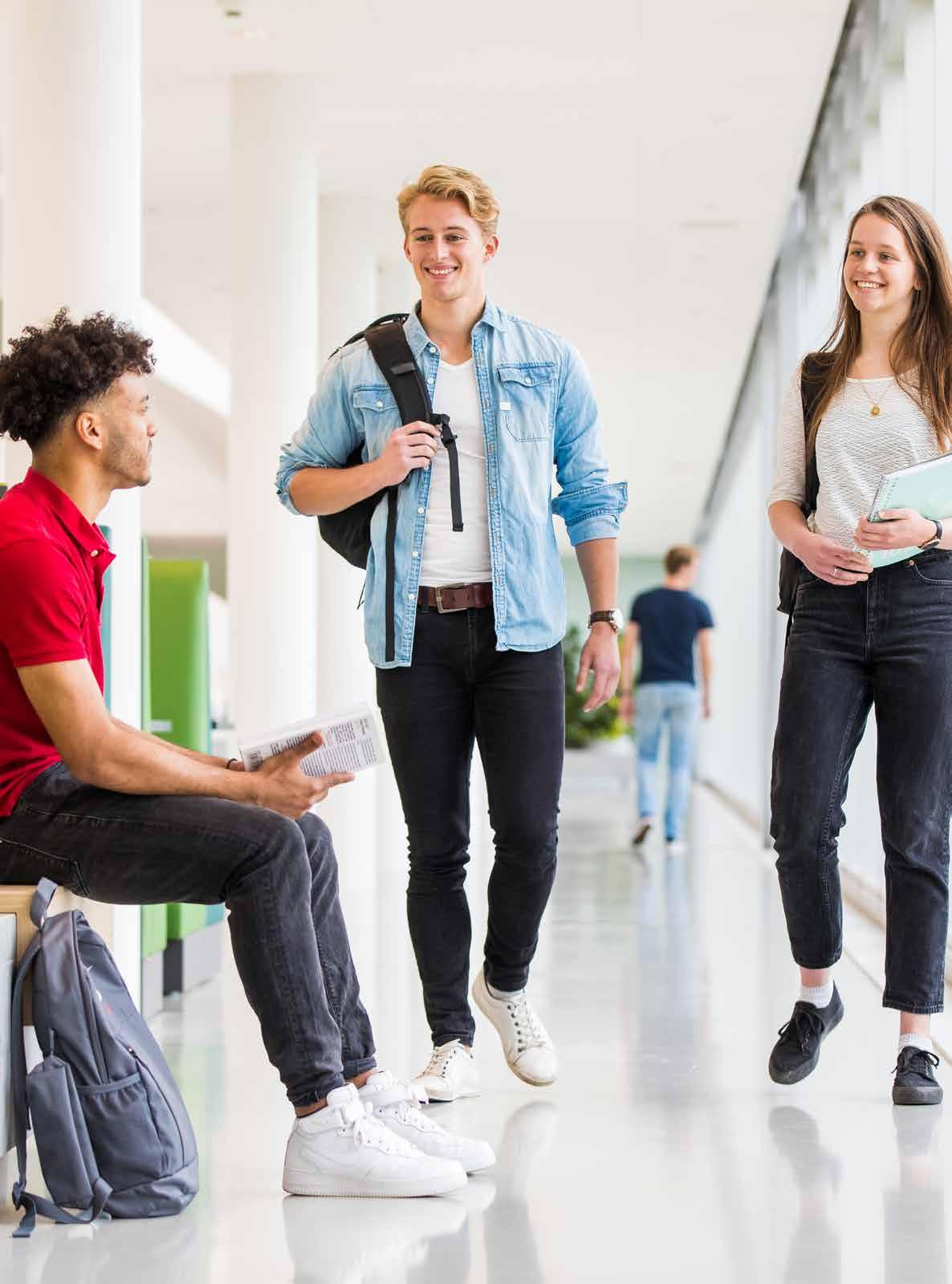
6 minute read
Teaching
from About us 2021
Our teaching is closely linked to our research
Small classes, contact with diverse cultures and innovative teaching methods are features of our teaching programmes for students from the Netherlands and abroad.
Leiden University offers around 47 bachelor’s and 81 master’s programmes. Seventeen of the bachelor’s programmes and almost all of the master’s programmes are taught in English. We also offer a number of joint programmes together with Delft University of Technology and Erasmus University Rotterdam. We want to encourage our students to get the most out of their studies and to complete their degree programmes within the time available. Personal supervision and a system of binding study advice in the first year are important factors in our students’ success. Curiositydriven learning, where students contribute to our research, is the essence of our teaching. Developing students’ talents to the maximum is a key aim in Leiden.
VISION ON TEACHING AND LEARNING Leiden University aims to play a key role in educating students as academic professionals and engaged, responsible citizens. Our graduates will help resolve the challenges of contemporary society, both within and outside academia. This ambition is the key principle of our revised vision on teaching and learning: learning@ leidenuniversity. To achieve this ambition, we are committed to delivering education that is strongly research driven, promotes active learning and stimulates the development of academic and professional skills, while at the same time offering scope for individual choices. The ideal teaching and learning environment at Leiden University is internationally and interculturally diverse and has close links with society. Both scientific and societal issues form a continuous source of inspiration for our teaching.
INTERNATIONALISATION Working and studying in an international community generates new insights, inspiring contacts and stronger research and teaching. Internationalisation helps make the world a safe, healthy, sustainable, prosperous and just place, and prepares students for the globalising world. We believe it is important for our students to develop an international mindset and feel comfortable with other cultures. A period of study abroad is the ideal opportunity for them to broaden their horizons and have a valuable and unforgettable experience. As the coronavirus pandemic comes to an end, the options for studying abroad will increase once again. Our global network of partners will be of help here. HONOURS ACADEMY Our Honours Academy offers talented, motivated and ambitious school pupils and students an extracurricular programme in the form of: •Pre-University College for secondary-school students •Honours College for bachelor’s students •Leiden Leadership Programme for master’s students
STUDENT LIFE The lively city of Leiden, with its rich history and picturesque canals, is a pleasant place to live, study and relax. Everything students might need is within walking distance in this compact city: from University buildings, shops and student bars, to student houses and associations (over 20!), and much, much more. The vibrant city of The Hague is a growing and internationally oriented student city that has a wealth of opportunities for students. It has many leisure and entertainment facilities, and Campus The Hague is home to a growing number of student associations. Both cities are close to the beach. The lively, vibrant student life in Leiden and The Hague has taken a different shape during the coronavirus pandemic. We trust that better times lie ahead.
With our research, we are working towards a fundamental understanding of the world and the people around us. The goal of our researchers is to make the unknown known and push the boundaries of existing fields of science.
Our innovative research covers a very wide range of academic fields, and has a firm disciplinary basis. Collaboration between disciplines is our top priority. Our researchers are inspired by scientific and societal issues, and are guided in their work by the highest commitment to quality and integrity. Our research infrastructure, facilities and collections are among the best in the world. We focus on five broad clusters of disciplines and one overarching research theme (Artificial Intelligence).
FUNDAMENTALS OF SCIENCE From the atomic nucleus to the enigmas of the human brain: Leiden’s physicists, social and behavioural scientists and biomedical specialists study the minutest particles, the greatest infinities and the oldest galaxies. They also explore the origins of our individual and group behaviour, the most complex datasets and artificial intelligence with its wide range of applications. Their research is driven by the desire to unravel the deepest secrets of humans and the universe, to make the unknown known and to find ways to apply this knowledge. LIFE SCIENCES The fundamental basis of all life comprises complex processes involving cells, molecules and DNA. Knowledge of the human genome, powerful microscopes and gene expression techniques give researchers ever-increasing opportunities to understand and control the most fundamental biological processes. Our researchers use this knowledge to seek and find clues for new medicines and therapies. This research field is closely linked to the field of health and wellbeing.
HEALTH AND WELLBEING Leiden researchers and physicians seek the causes of and the best treatments for complex diseases such as cancer. They are actively engaged in regenerative medicine, personalised medicine and population health, and believe prevention is key to a healthy society. This calls for knowledge of what constitutes a healthy lifestyle and why people do not always choose this option. This research largely takes place outside the clinical environment. This brings us to the question of how best healthcare can be organised. This involves not only medical but also social, psychological, organisational and legal considerations. This is how our researchers in Leiden and The Hague work together to promote a healthier society.
LAW, POLITICS AND ADMINISTRATION A safe and sustainable society calls for a deep understanding of how societies work on a national and international scale. Our social and behavioural scientists work to understand political, societal, organisational and security issues, and our legal and criminology experts collaborate closely with national and international institutions, bringing together diverse legal and criminological insights.
LANGUAGES, CULTURES AND SOCIETIES Our researchers study human culture from today and the distant past in the broadest sense of the word. They provide us with essential knowledge of history, literature, music and other performing arts in Western and non-Western cultures. Research in the humanities and social and behavioural sciences plays a crucial role in current debates on our societal and cultural roots, ranging from migration issues, ethical questions and national and religious identity to
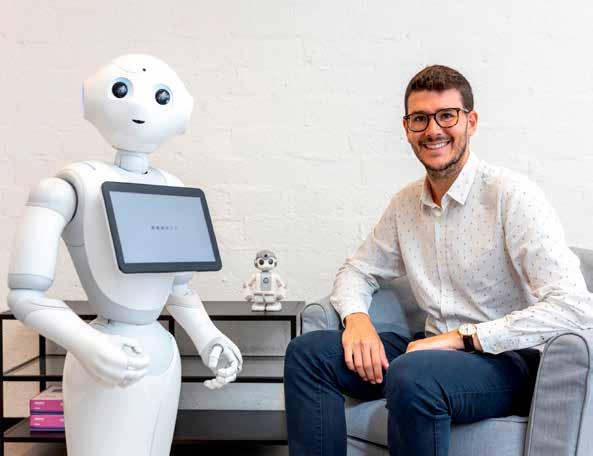
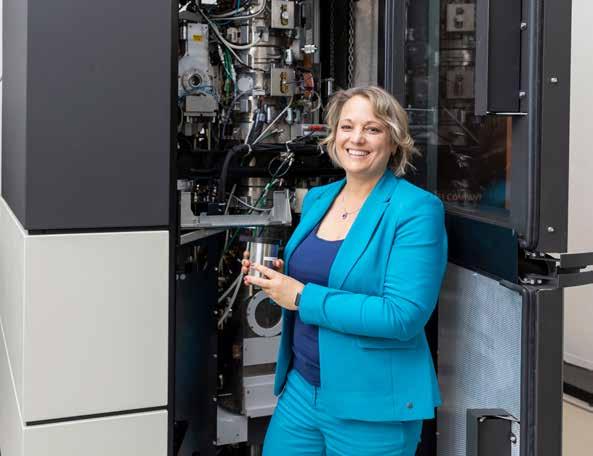
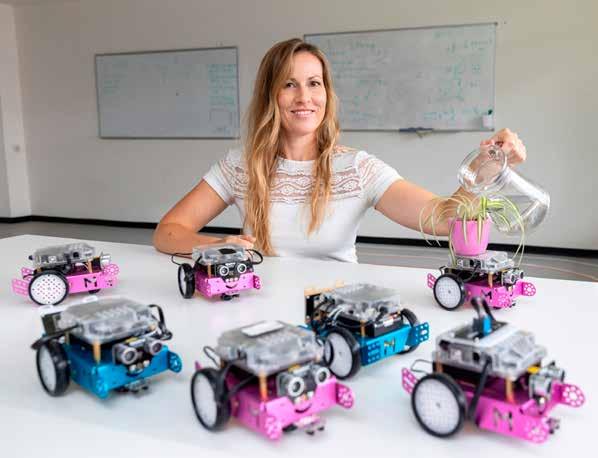
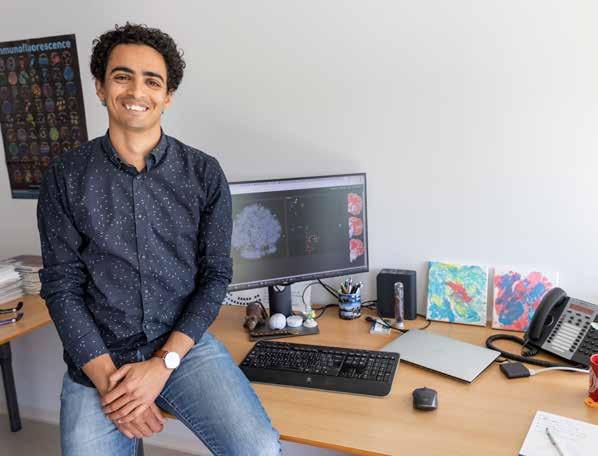
Artificial intelligence (AI) will fundamentally change our lives in the near future. Researchers from different disciplines are working on this, together with government and business. Clockwise from top left: Ariane Briegel, Ahmed Mahfouz, Tessa Verhoef and Eduard Fosch Villaronga.
technological progress and the influence of the media.
ARTIFICIAL INTELLIGENCE IN LEIDEN From self-driving cars to innovative drug development: artificial intelligence (AI) will fundamentally change our lives in many different ways. Our computer scientists study this technology at a deep and fundamental level, but we are also looking for medical applications and answers to new issues relating to liability and privacy, for example. Our researchers from all disciplines work closely with one another as well as with academic partners from Delft University of Technology and Erasmus University Rotterdam and other partners from the public and private sector. LORENTZ CENTER
The Lorentz Center is a unique location where researchers from all around the world can work together intensively. Researchers attend workshops on single or multiple disciplines in this inspiring academic environment.










